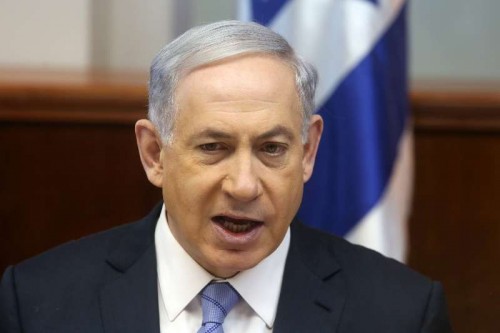
Israeli Prime Minister Benjamin Netanyahu has voiced his willingness to discuss the borders of Jewish settlement blocs in future peace talks with the Palestinians, an Israeli newspaper reported on Tuesday.
Haaretz reported that Netanyahu made the proposal during a meeting with European Union (EU) foreign policy chief Federica Mogherini who visited the region last week.
This is the first time that the right-wing Israeli leader has expressed his readiness to discuss the size of Jewish settlement blocs and their borders since he started his fourth term as Israel’ s prime minister last month.
David Baker, Netanyahu’s spokesman, declined on Tuesday to make comments on the report, Xinhua news agency reported.
According to the report, Netanyahu clarified that such discussions would outline exactly where Israel could continue construction.
“It’s clear that there are areas that will remain under Israeli control under any agreement, just as it is clear there are areas that will remain under Palestinian control under any agreement,” Netanyahu was quoted as telling Mogherini.
“Therefore, we can advance toward understandings on which areas we can continue building since it would remain under Israeli sovereignty,” he said.
While appreciating Netanyahu’s commitment to resume peace talks, Mogherini said the EU expected to see actions, the newspaper reported.
“I’m interested in seeing steps on the ground that will back up your declarations and show commitment to the two-state solution,” Mogherini was quoted as saying during the meeting.
European countries have been more and more concerned over Israel’s ongoing construction in Jewish settlements in the West Bank and East Jerusalem and the collapse of peace talks between Israel and the Palestinians.
Several states had expressed in recent months their support for the establishment of a Palestinian state.
Since the collapse of their talks with Israel in April last year, the Palestinians have joined many international treaties and have been trying to promote unilateral steps to end the Israeli occupation of Palestinian territories.
Netanyahu told Mogherini prior to their meeting that he was still committed to the two-state solution in an effort to end the Israeli-Palestinian conflict, with Israel co-existing with a demilitarized Palestinian state which acknowledges Israel as the Jewish state.
The Israeli leader has been criticised recently after backtracking from his declaration of support for the two-state solution in a 2009 speech.
Days before the March 17 elections, he told a news website that he would not permit the creation of a Palestinian state under his watch.
Netanyahu’s latest statements were seen as part of his efforts to reassure the international community after establishing a right-wing government following the elections, which includes the far-right Jewish Home party backed by Jewish settlers.
Netanyahu and his Likud party did not specify in their agreements with the coalition partners any intention of reviving the peace talks with the Palestinians.
In a move denounced by the Palestinians, Netanyahu appointed Interior Minister Silvan Shalom, a veteran Likud member, early last week as the person in charge of the peace talks with the Palestinians.
Shalom has been known for his support of settlement construction and objection to a Palestinian state.